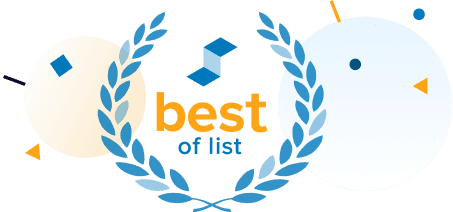Best Debt Consolidation Loans
April 2024
When done right, consolidating high interest debts into one loan can help you get out of debt faster. Here is our list of the best personal loans for debt consolidation.

SuperMoney may receive compensation from some or all of the companies featured, and the order of results are influenced by advertising bids, with exception for mortgage and home lending related products. Learn more
Paying off debt is never fun. And when you owe several creditors, debt management becomes even more of a challenge. Debt consolidation loans can help you lower your interest rate, so more of your payment goes toward paying the principal of your loan. Lower interest rates allow you to save money and get out of debt faster. Of course, debt consolidation is only one of many tools for paying off debt. And it will not help if you have too much debt or haven’t solved underlying issues in your spending habits.
Here is SuperMoney's list of the best debt consolidation loans.
Methodology
SuperMoney's list of the best-rated personal loans for debt consolidation is dynamically generated based on advanced algorithms and community feedback. When looking for the best personal loans for debt consolidation, focus on lenders that offer large loan amounts and low interest rates.
Frequently Asked Questions About Debt Consolidation And Personal Loans
What is a debt consolidation loan?
A debt consolidation loan is a loan used to pay off your existing debts. For example, let's say you have balances in several high interest credit cards. You could use a debt consolidation loan with better terms and rates to pay them all off.
What are the advantages of debt consolidation loans?
There are three main benefits to consolidating debt into a single loan.
- Lower interest rates: A lower interest rate can help you save money and get out of debt faster.
- A single payment: Instead of having to make multiple payments, you just have to remember to make one payment.
- Higher credit score: A debt consolidation loan can help you improve your credit score if you use it to pay off credit card debt.
What are the disadvantages of debt consolidation loans?
One of the biggest risks of using a debt consolidation loan is it may push you deeper into debt if you are tempted to borrow more once your credit cards are no longer maxed out. There is also the possibility that a debt consolidation loan costs more than the debts you are currently paying off if you can't find a loan with a lower interest rate. Even if the interest rates are lower, you could still pay more interest over the life of the loan if it has a longer term. That's why it is important to calculate the overall cost of a debt consolidation loan when choosing the best get-out-of-debt tools for your situation.
Prepayment fees are another thing to consider when calculating the cost of a debt consolidation loan. Some lenders charge a fee if your pay the loan balance early.
Should I use a personal loan to consolidate my debt?
That depends on your situation. Do you have good credit? And can you qualify for a debt consolidation loan with a lower interest rate than you're currently paying? If so, a debt consolidation loan could be an excellent solution for you. However, if you have poor credit and can't qualify for a lower interest rate, you may be better off using other methods to pay off your debt.
What should I look for when comparing the best debt consolidation loans?
Keep an eye out for the following features:
- APR. You'll want to find a loan with an interest rate lower than the APRs of your current outstanding debts.
- Loan term. Look for the shortest loan term whose monthly payment you can afford.
- Monthly payment. Make sure that your consolidated monthly payment is an amount you can comfortably afford.
- Penalties. If you worry that you may be late on a payment, avoid loans with steep late payment penalties.
- Ease and accessibility. Make paying off your debt as easy as possible. Look for a lender who offers a simple, accessible portal through which to manage your debt. If possible, set up a automated transfers to make sure you never miss a payment.
Do debt consolidation loans help my credit?
If you're currently struggling to make multiple debt payments on time, a debt consolidation loan may help you improve your payment history, which could help your credit.
It can also improve your credit utilization ratio -- the percentage of your total revolving credit limit that you're using at a given time. On the other hand, if you continue to rack up balances on your credit cards after consolidating your credit card debt, it can cancel out any positive impact on your credit score and put you in an even worse financial situation.
Also, if you apply for several debt consolidation loans, you may get multiple hard credit pulls on your credit report, which will shave off points from your credit score.
Is it smart to take a personal loan to pay off credit cards?
It can be a smart move to take a personal loan out to pay off your credit cards. If you're only making minimum payments a $1,500 balance with a 19% APR can take 17 years to pay off and it will cost you more than $2,138 in interest (source). You can save a lot of money and pay off your debt sooner with a personal loan that has a low interest rate.
For example, say you have two maxed-out credit cards—one with a $1,000 credit line and one with a $750 credit line. Your APR on both of them is 25%. If you take out a 2-year personal loan with a 12% APR to pay off the balance, it would be beneficial. You could pay less in interest and boost your credit score by lowering your credit utilization rate.
On the other hand, if the personal loan has an APR that is higher than 25% or the fees cause the cost to be more, then it wouldn't be the best route.
Should I pay off a credit card or personal loan first?
The key to saving the most money is paying off the debt accounts with the highest costs first. So start with the account with the highest interest rate. In most cases, credit cards have higher rates, but that's not always the case.
Note: A benefit of paying off credit cards is that it lowers your credit utilization rate, which boosts your score.
How can I use a personal loan to pay off credit card debt?
When you receive a personal loan, paying off credit card debt is simple. You use the proceeds of the loan to pay off your credit card balance(s). Then, you make the payments as scheduled on your personal loan.
Does getting a personal loan to pay off credit cards hurt your credit?
You may see your credit score dip when you get a personal loan for a few reasons. First, a hard inquiry on your credit report causes your score to go down. Second, adding a new account can lower your average age of credit accounts, which can also hurt your credit. Third, the credit mix is also a factor. If you don't have a personal loan, adding a new credit type could more than compensate for the hard pull on your credit. Additionally, remember the credit score drop is only temporary. As you begin making payments on your loan and time passes, the new account can help to improve your score.
What is the best loan to pay off credit?
The best type of loan to pay off credit card debt is often an unsecured personal loan with low or no fees and a competitive APR. It's essential to shop around to look for a lender that will offer you the best deal. An excellent place to start is with the best loans list above.
Own a home? Learn what you should know about using a HELOC to pay off credit card debt.
What is credit card refinancing?
Credit card refinancing refers to moving your debt from your current lender to another one with better terms. You can refinance credit card debt by transferring your balance to another credit card or paying it off with a loan.
The lenders above are a great place to start if you are looking for personal loans with competitive rates and terms.
What else can I use to consolidate my debt?
Personal loans aren't the only way to consolidate your debt. You can also try:
- A balance transfer onto a credit card. This is an especially attractive option if you can qualify for a balance transfer card with a 0% APR promotional period. However, do the math to make sure that you can pay off your debt before the introductory period ends.
- A home equity loan. If you have equity in your home, a home equity loan or line of credit could get you a lower interest rate than a personal loan.
- Debt settlement. Depending on how much you owe, working with a debt settlement company might be your best bet. This is especially advantageous if you're unable to qualify for a debt settlement loan with a low interest rate.
Find out what rates, loan amounts, and terms you qualify for with a personal loan before you choose a debt consolidation option that could put your home or credit at risk. The lenders in the list above are a great starting place. You can also complete this short form to get a list of prequalified loan offers. Don't worry. It won't hurt your credit and there are no strings attached.
About the Author

SuperMoney
SuperMoney is the most comprehensive financial services comparison site around. We have published hundreds of personal finance articles and provide detailed reviews on thousands of financial products and services. Our unbiased advice and free comparison tools help consumers make smart financial decisions based on hard data, not marketing gimmicks.
Table of Contents
You might also like
Get Competing Personal Loan Offers
Compare real offers from multiple lenders.